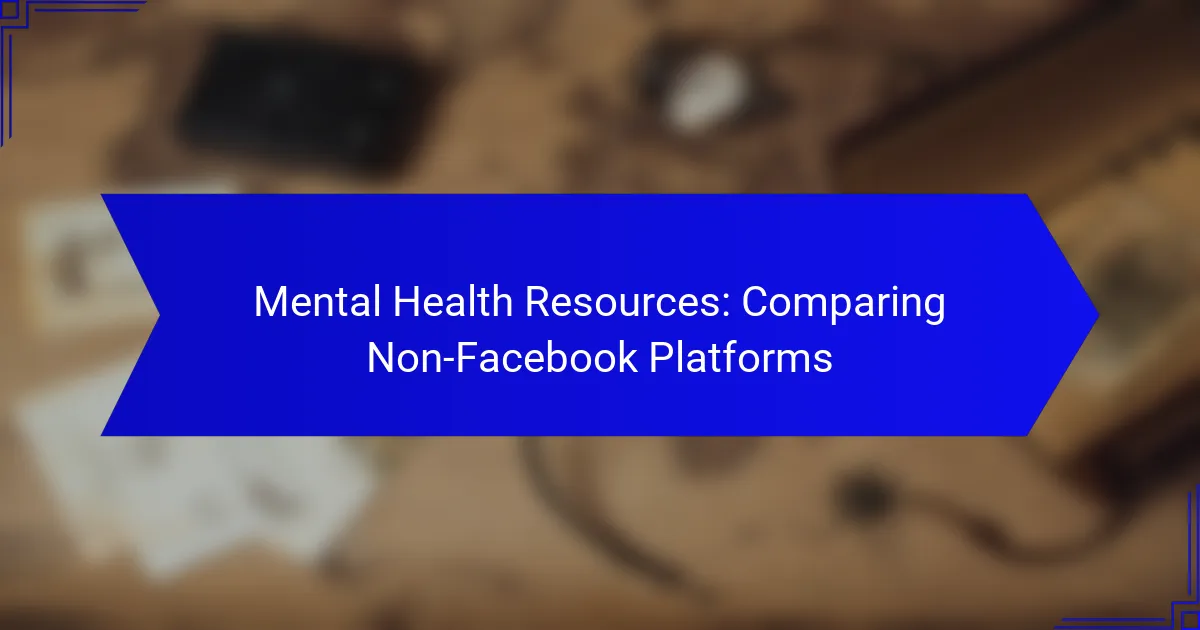In today’s digital age, numerous mental health platforms beyond Facebook offer tailored services to meet diverse needs. These platforms provide access to licensed professionals, peer support, and self-help resources, enhancing the accessibility and personalization of mental health care. By comparing features such as therapy options, pricing, and user experiences, individuals can make informed choices about the best resources for their mental well-being.
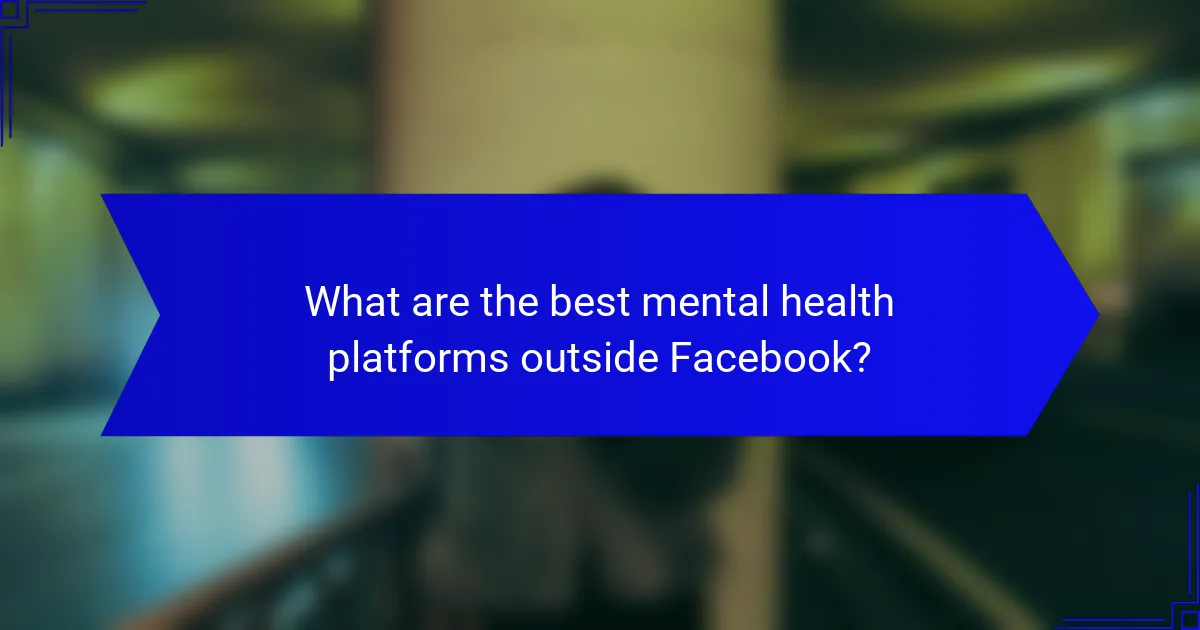
What are the best mental health platforms outside Facebook?
Several effective mental health platforms exist beyond Facebook, offering various services tailored to individual needs. These platforms provide access to licensed professionals, peer support, and self-help resources, making mental health care more accessible and personalized.
BetterHelp
BetterHelp is an online counseling platform that connects users with licensed therapists through messaging, video, and phone sessions. It operates on a subscription model, typically costing between $60 to $90 per week, depending on the therapist’s experience and the user’s location.
Users can choose their therapist based on profiles and specialties, allowing for a more tailored experience. The platform is available in many countries, making it a flexible option for those seeking help.
Talkspace
Talkspace offers a similar service to BetterHelp but emphasizes text-based therapy, allowing users to communicate with their therapists at their convenience. Pricing ranges from about $65 to $99 per week, depending on the plan selected.
This platform also provides specialized services for teens and couples, making it versatile for different demographics. Users can switch therapists if needed, ensuring a good fit for their mental health journey.
7 Cups
7 Cups focuses on providing emotional support through trained listeners and licensed therapists. The platform offers free chat support with listeners and paid therapy sessions, with costs typically around $150 per month for professional help.
This platform is particularly beneficial for those seeking immediate, peer-based support without the commitment of ongoing therapy. It also features self-help resources and community forums for additional support.
Headspace
Headspace is primarily a meditation and mindfulness app that promotes mental well-being through guided meditations and mindfulness exercises. It operates on a subscription basis, costing around $12.99 per month or $69.99 annually.
While not a therapy platform, Headspace can complement mental health treatment by helping users manage stress and anxiety through its extensive library of resources. It is suitable for individuals looking to enhance their mental resilience.
Calm
Calm is another popular app focused on meditation, sleep, and relaxation techniques. It offers a variety of guided meditations, sleep stories, and calming music, with a subscription fee of approximately $14.99 per month or $69.99 per year.
Calm is ideal for users seeking to improve their overall mental health through relaxation and stress management techniques. Its user-friendly interface makes it accessible for all ages, promoting a holistic approach to mental wellness.
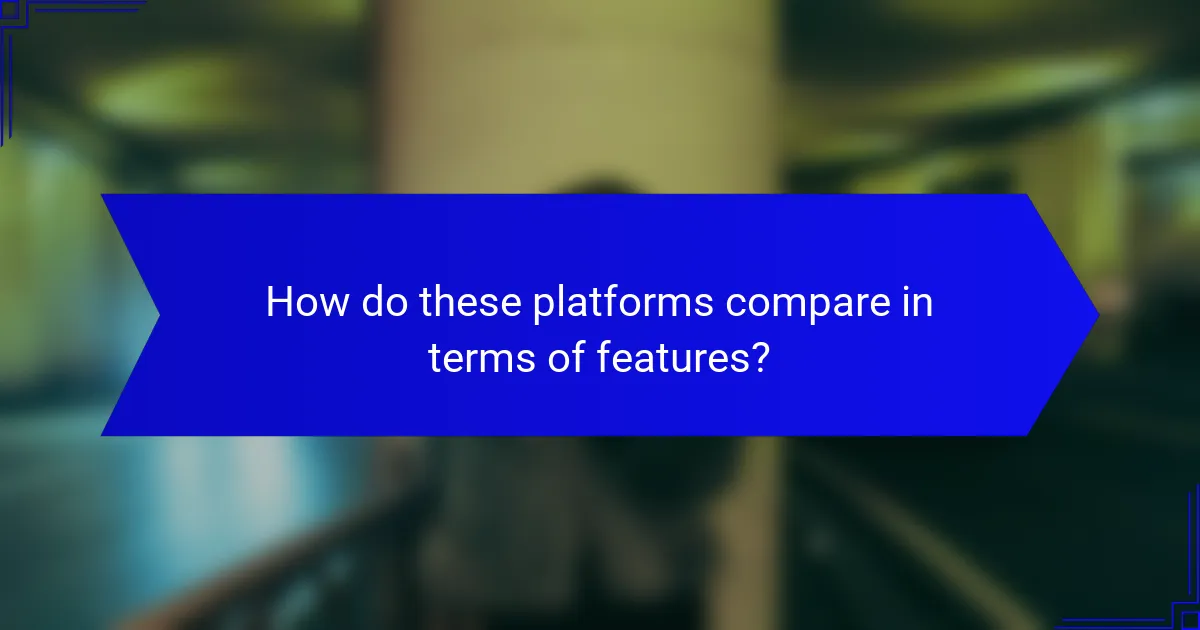
How do these platforms compare in terms of features?
Non-Facebook mental health platforms vary significantly in their features, impacting user experience and effectiveness. Key aspects include therapy options, pricing structures, user accessibility, and mobile app availability.
Therapy options
Different platforms offer a range of therapy options, from text-based chat to video sessions. Some focus on specific modalities like cognitive behavioral therapy (CBT), while others may provide access to various therapeutic approaches. For instance, platforms like BetterHelp and Talkspace connect users with licensed therapists for personalized sessions, whereas others may offer self-guided resources.
When choosing a platform, consider what type of therapy you prefer and whether you need specialized support for issues like anxiety or depression. Look for platforms that allow you to switch therapists if needed, ensuring a better fit for your needs.
Pricing structures
Pricing structures for mental health platforms can vary widely, typically ranging from monthly subscriptions to pay-per-session models. For example, BetterHelp may charge around $60 to $90 per week, while others might offer single sessions for $100 or more. Some platforms also provide sliding scale fees based on income.
It’s essential to review what is included in the pricing, such as the number of sessions or additional resources like workshops. Always check if there are any hidden fees or cancellation policies that could affect your overall cost.
User accessibility
User accessibility is crucial for effective mental health support. Many platforms are designed to be user-friendly, with intuitive interfaces that cater to a wide range of tech-savviness. Accessibility features, such as screen reader compatibility and language options, can enhance the experience for users with disabilities.
Before committing to a platform, assess its accessibility features and whether it meets your specific needs. Look for platforms that offer 24/7 support or have community forums for additional peer support.
Mobile app availability
Mobile app availability is a significant factor for users who prefer therapy on the go. Many platforms, like Talkspace and BetterHelp, offer dedicated mobile apps that allow users to connect with therapists, access resources, and track progress from their smartphones. This convenience can enhance engagement and make therapy more accessible.
When evaluating platforms, check if they have a mobile app and its functionality. Ensure the app is compatible with your device and offers features that suit your lifestyle, such as offline access or reminders for sessions.
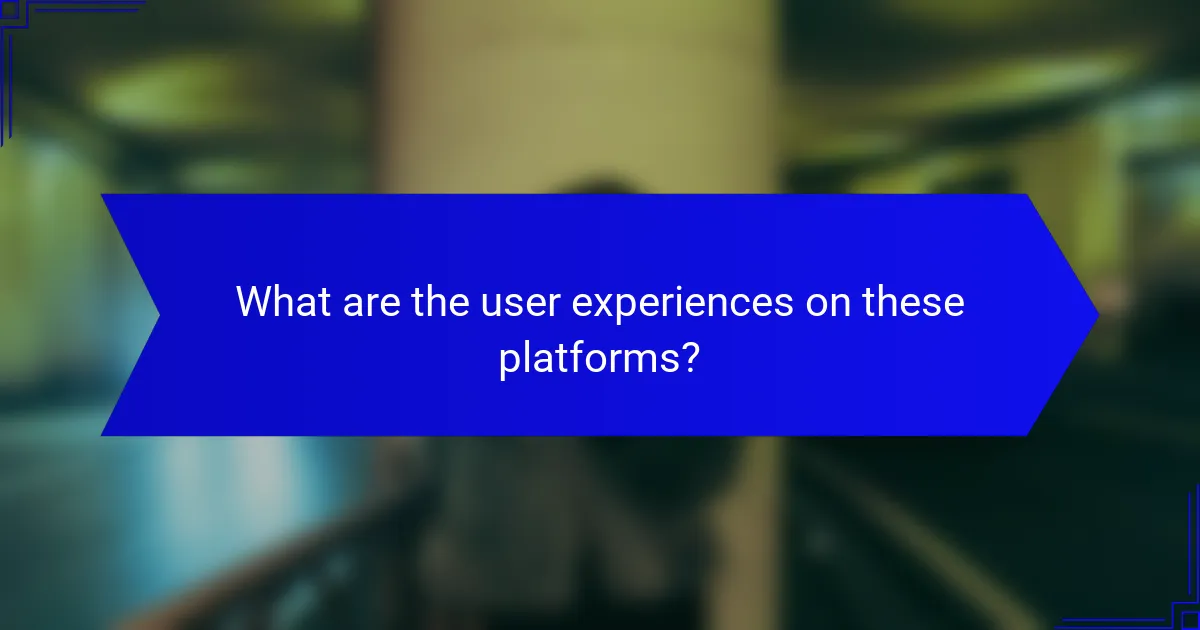
What are the user experiences on these platforms?
User experiences on mental health platforms like BetterHelp, Talkspace, and 7 Cups vary significantly based on factors such as accessibility, therapist quality, and user interface. Understanding these experiences can help individuals choose the right service for their needs.
BetterHelp reviews
BetterHelp is known for its user-friendly interface and a wide range of licensed therapists. Many users appreciate the convenience of accessing therapy via messaging, video, or phone calls, making it easier to fit sessions into their schedules.
However, some reviews highlight concerns about the variability in therapist quality, as experiences can differ greatly depending on the assigned professional. Users often recommend being proactive in switching therapists if the initial match does not meet their expectations.
Talkspace testimonials
Talkspace offers a unique approach by allowing users to communicate with therapists through text, audio, and video messages. Many testimonials praise the platform for its flexibility and the ability to send messages at any time, which can be particularly beneficial for those with busy lifestyles.
On the downside, some users report feeling disconnected due to the lack of face-to-face interaction. It’s important for potential users to consider whether they prefer a more personal connection or if asynchronous communication suits their needs better.
7 Cups feedback
7 Cups provides free emotional support through trained listeners and offers paid therapy with licensed professionals. Users often commend the platform for its supportive community and accessibility, especially for those who may not be ready for traditional therapy.
However, the quality of support can vary, as the free listeners may not have formal training. Users should weigh the benefits of immediate support against the potential need for professional therapy if their issues are more severe.
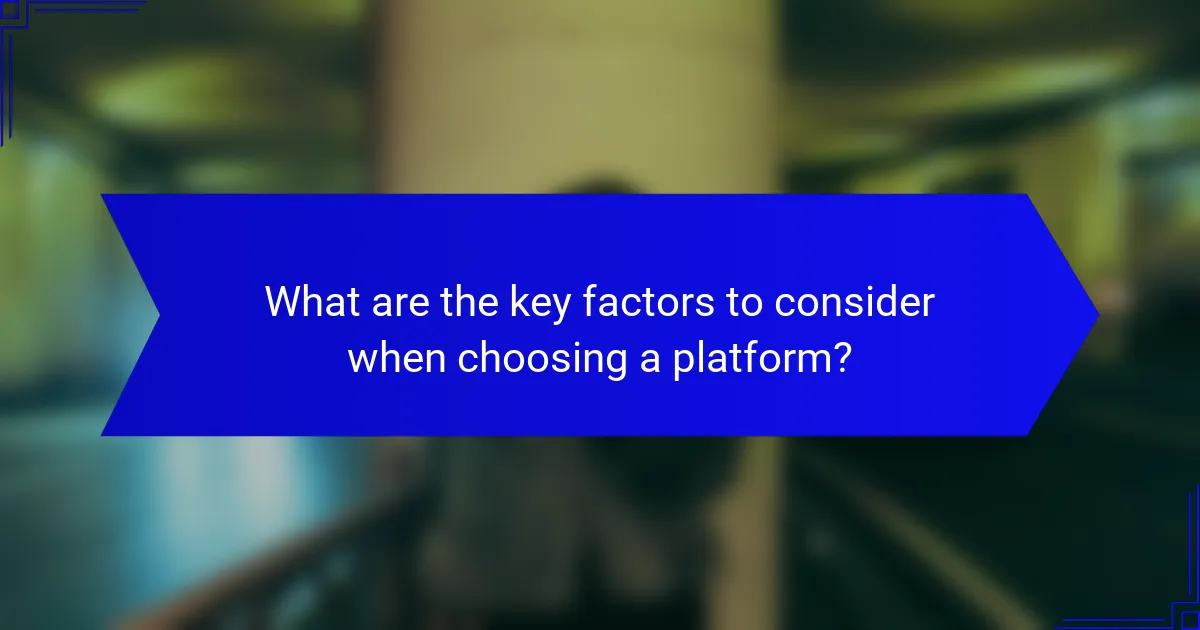
What are the key factors to consider when choosing a platform?
When selecting a mental health resource platform, consider factors such as cost-effectiveness, service variety, and user interface. These elements significantly influence the overall experience and effectiveness of the platform in meeting your mental health needs.
Cost-effectiveness
Cost-effectiveness is crucial when evaluating mental health platforms. Look for options that provide a range of services at competitive prices, ensuring you get the best value for your investment. Many platforms offer subscription models, pay-per-session rates, or even free resources, which can help you find a suitable fit for your budget.
For example, some platforms may charge between $30 to $100 per session, while others might offer monthly subscriptions ranging from $20 to $60. Assess what services are included in these costs to determine their overall value.
Service variety
The variety of services offered by a platform can greatly impact its usefulness. Look for platforms that provide a mix of therapy options, such as individual therapy, group sessions, and self-help resources. This diversity allows you to choose the type of support that best meets your needs.
Additionally, consider whether the platform includes specialized services, such as support for specific mental health conditions or access to wellness resources like meditation and mindfulness exercises. A broader range of services can enhance your overall experience and effectiveness in managing mental health.
User interface
A user-friendly interface is essential for an effective mental health platform. The design should be intuitive, making it easy to navigate and access resources without frustration. A well-organized layout can significantly enhance your engagement and willingness to use the platform regularly.
When evaluating user interfaces, consider factors such as mobile compatibility, loading times, and the clarity of information presented. Platforms that prioritize user experience often lead to better outcomes, as they encourage consistent use and interaction with available resources.
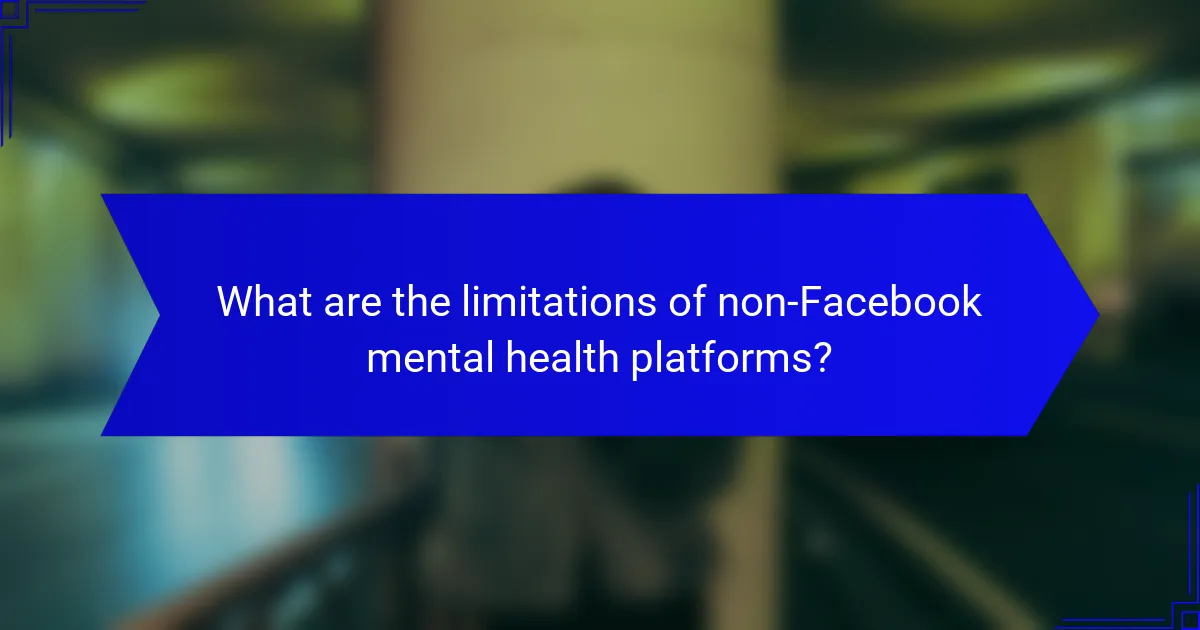
What are the limitations of non-Facebook mental health platforms?
Non-Facebook mental health platforms often face several limitations that can impact their effectiveness. These include concerns about privacy, a lack of localized resources, and potentially lower user engagement compared to more established platforms.
Privacy concerns
Privacy is a significant issue for non-Facebook mental health platforms, as users may worry about how their data is collected and used. Many platforms may not have the same level of security or transparency as larger networks, leading to hesitance among users to share personal information.
To mitigate privacy risks, users should look for platforms that clearly outline their data protection policies and comply with regulations such as GDPR in Europe or HIPAA in the United States. Opting for services that offer end-to-end encryption can also enhance privacy.
Limited local resources
Non-Facebook mental health platforms may struggle to provide localized resources, which can be crucial for users seeking support tailored to their specific cultural or regional needs. This limitation can hinder access to relevant services, such as local therapists or community support groups.
When choosing a platform, users should consider those that offer localized content or partnerships with local mental health organizations. This can improve the relevance of the resources available and ensure better support for users in their area.
Potential for lower engagement
Engagement levels on non-Facebook mental health platforms can be lower due to a lack of community features or social interaction that larger platforms provide. Users may find it challenging to connect with others, which can reduce motivation to participate actively.
To enhance engagement, platforms should incorporate features like forums, group therapy sessions, or peer support options. Users might also benefit from platforms that offer gamification elements or regular check-ins to encourage consistent use and interaction.
